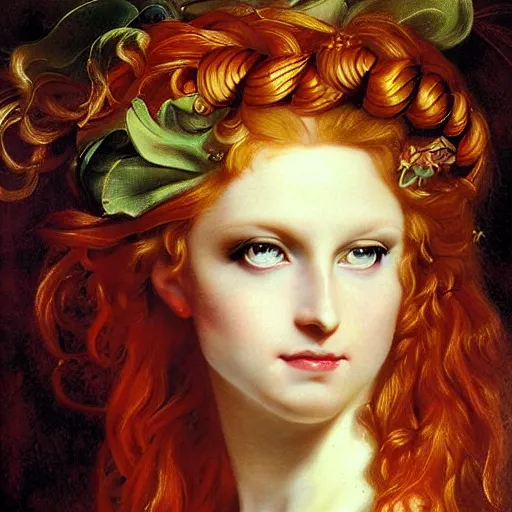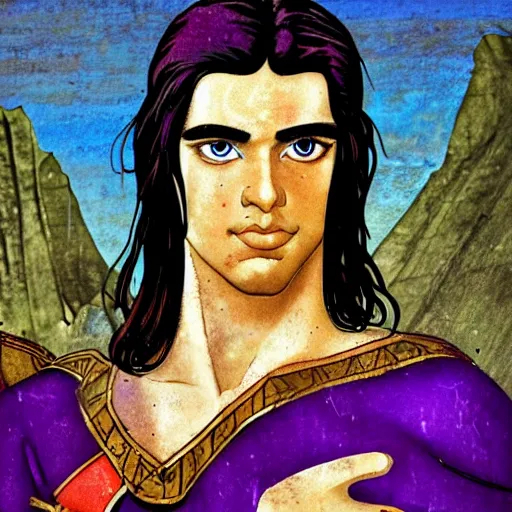Mystic elves
The mystic, or western elves, live in the Jungle of Zililon. They are usually dark-haired and speak a Mystic elven dialect, which is a more modern version of the Elven language. Enjoying life is characteristic of them, instead of accumulating wealth, they look for luxury. They are demanding of their environment, clothing, food, and relationships. They are open and talented to magic, it is part of their everyday life. They follow many deities, usually more than one at a time, their "creator" god is Alabyran, the God of Magic.
The family is the smallest organization, but rarely more than two generations live together. The parents try to put the young people on their own feet as soon as possible, so that they can live with their own comfort and freedom. When the young mystic elves grow up, they choose a new name for themselves. It is characteristic of noble families that, in order to preserve the social circle, young people carry on the name of the noble family - the name is also an invitation to certain higher circles. Mystic elves are aware of the appearance of other races and are primarily attracted to features that differ from this. A very thin body with long, graceful limbs is ideal. They like long hair, but they are not averse to short hairstyles either. Almond-shaped eyes and a high hairline are considered the most perfect, and long earlobes are considered "sexy". "Too round" hips in women are just as much a sign of excessive comfort as beer belly in men.
First of all, a perfect appearance is important, but susceptibility to magic and sophisticated, broad-minded education are also expected.
Mostly men are expected to be able to fight perfectly in at least one type of weapon. Urban women must have good economic sense and handle the family's wealth properly. In the countryside, however, all adults were expected to be able to hunt and take care of themselves independently.
Parents and ancestors should be respected, and the same applies to religious and local leaders and officials. Of course, whoever has more money sets the rules in Zililon.
Most of the relationships in Zililon are couples, but they are only interested in what goes on in someone else's bedroom on a gossip level. According to them, desire, love and marriage are three separate concepts, and in a fraction of the cases, two people share all three together. They are considered extremely lucky. Both women and men freely choose their partners, because their spouses are treated more like economic partners.Culture
Általános Öltözködési szokások
Mystic elves love colorful, light clothes, especially silk, which is produced in large quantities. In addition, they also wear linen, leather and fur, and the poor wear wool. All of their clothes, which are not made for fighting or hunting, are colorful and patterned. They like metal and gemstone decorations, batik color transitions. They usually cover their bodies with several layers of clothing regardless of the temperature. They also like to carry large quantities of jewelry, precious metals, gemstones, pearls, wood and bone. They like intricately worked decorations and plant patterns. They often wear makeup and perfume.
Művészet és Építészet
For them, architecture, sculpture, painting, poetry, music and acting and dance are part of self-expression. Although most settlements are built on terraces located in trees, the truly wealthy have even more special palaces built for themselves, which float above the cities.
Általános szokások, hagyományok, rituálék
ENGAGEMENT:
In Vasanna, Elves betroth each other like Humans, or don't engage at all. Followers of Alabyran or Narmiraen, if they don't hold a Human-like engagement, they immediately prepare for the wedding. Engagements are not held in Zililon, only in the case of pre-arranged marriages. Arranged marriages can occur mainly in Zililon, but also in Vasanna.
MARRIAGE:
Two Elves usually join their lives by mutual agreement.
In Zililon and Vasanna: In the temples and shrines of Alabyran, Narmiraen, Fliadalis and Saphielle, the couple prays together and then announces the marriage to the congregation. These marriages can be dissolved, but the dissolution must be initiated before the local authorities and a declaration of the division of property must be made. In other communities that follow minor deities, there is no marriage in the traditional sense.
Mystic elven weddings can be multi-day events. Settled married couples (who do not live in the jungle) are registered by the local authorities according to their place of residence. In Zililon, Elves like to give each other some kind of personal gift, typically jewelry, when getting married.
In Vasanna and Zililon, most Elven weddings take place in the spring and summer.
Születési és keresztelő rítusok
For the Elves, the blessing of children is a joyous celebration, and compared to other races, it rarely happens, so it is an important event for the whole community. In Zililon and Vasanna, couples typically announce the pregnancy to the family and their (religious) community, but if the identity of the father is not public (or unknown) for some reason, then the woman can even keep the matter to herself, and no one will talk about it. Half-blood (typically half-human) children are therefore viewed less favorably than Elven children. Half-elf children and their parents can expect some discrimination, overt or covert, especially in Zililon.
In Zililon and Vasanna, the birth of a child is celebrated by the family, the community (be it the place of residence or religious group) when the child is presented, after the maternity period (which can be as long as a month) is over. Mothers are in no hurry, so things go very smoothly. Members of the community typically provide the child and the mother with useful gifts during the celebration.
If the child's father is not related to the mother, the woman thanks him for the child (boy or girl) with bread with seeds or fruit.
Pregnancy and childbirth are a privileged process, diligent and dedicated hands take care of the mother and her child. It's extremely rare for either of them to get in trouble.
Children are given a name by their parents, which the child usually changes when it grows up.
Felnőtté válási rítusok
Elves become adults around the age of 100-150. In Zililon, becoming an adult is theoretically an independent decision, a young person is considered an adult as soon as he leaves the family and begins an independent life. In such cases, they usually choose a new name for themselves, and their parents call them by their "child name" at most. If a young person is still living with its parents at the age of 200, they usually buy or built a home for him, and force him to move out. In Vasanna, the young Elves, like the Dwarves, are enthusiastically preparing for independent life. Since they have many options to choose from (professionally, religiously as well), it is typical that they try many of them before choosing their first profession. At the age of 150, they usually learn a trade in part or in whole, and as soon as they have an independent income (as a master or apprentice), they declare themselves as adults and in many cases choose a new name. It is a peculiarity that in many cases the family name of the parent or master is taken out of respect.
Temetési és megemlékezési rítusok
Elven burials are quite mixed in Vasanna and Zililon as well. Followers of Narmiraen are usually buried in a coffin or an urn, which the deceased himself disposes of if there is a way to do so. Elf cemeteries are usually found on the lowest level of settlements, if it is underground, then we can talk about built-up catacomb systems. The largest such cemetery is currently located in Ellerion, the capital, where the multi-level catacomb system is also a kind of tourist attraction (it is closed at night and periodically).
Followers of Alabyran have a special funeral rite in which the body is embalmed and subjected to magical rites. Last ritual: funeral ceremony. Believers of powerful magicians/sorcerers and religious persons are said goodbye in the church before being laid to rest, and the remaining magical power extracted from the corpse is usually channeled into a blessed object. If the embalmed body is close to the church, it remains in the church, in some kind of stone coffin, if not, it is placed in a coffin in the crypt.
Mystic elves usually celebrate the end of a long life by glorifying his work and enumerating the good qualities of the deceased. Mourning ceremonies, unlike Dwarves, are relatively quiet. The funeral procession is also more reserved, a circle of family and friends gathers on the day of the funeral, they remember the deceased together. In wealthy families, a statue or painting is exhibited in memory of the deceased. One month later, the will will be promulgated (if there was one), or the assets and belongings will be distributed. It is believed that it is bad luck to touch the deceased's belongings earlier than this, as a result of which they may join the deceased in a short way. It is therefore customary for widows to wear some of the deceased's clothes (scarves, cloaks, shirts) during this time to show that they would like to go after their loved ones.
Portrait of Sorisana Qiyra: Mystic elf sorceress, former grandmaster of Ellerion Mystic University painted by Folen Darora.
Parent ethnicities
Encompassed species
Related Organizations
Related Locations
"Fresco of a Mystic Elf Man": The fresco was found in an ancient Mystic elf temple. It has not yet been decided whether it depicts the image of the god Alabyran or a high priest.






Megjegyzések